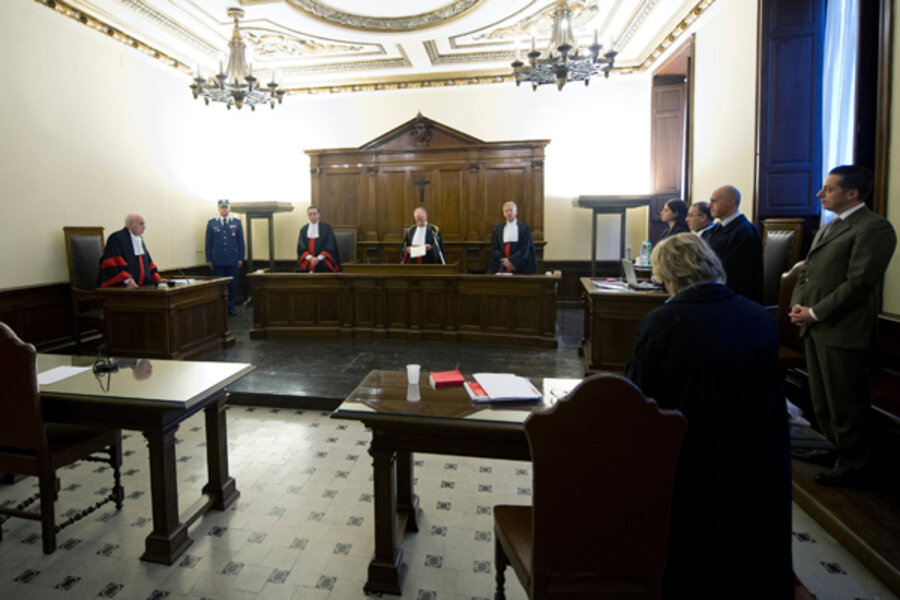Vatican trial: The butler did it, but did the IT guy help?
Loading...
| Vatican City
The former butler of Pope Benedict convicted of stealing papal documents had not allowed technicians to check his computer for the last six years, a court trying a second suspect in the Vaticanleaks scandal heard on Monday.
The detail was made public at the first hearing in the trial of Claudio Sciarpelletti, a computer expert who is charged with aiding and abetting Paolo Gabriele, the former butler.
The leaks scandal unleashed one of the biggest crises of Pope Benedict's papacy, embarrassing the Vatican at a time when it was struggling to overcome several child sex abuse scandals involving clerics, as well as mismanagement at its bank.
Gabriele was convicted of aggravated theft at a separate trial last month and sentenced to 18 months in jail for stealing sensitive papal documents and leaking them to the media. He kept some confidential information on his computer.
One of the pope's closest household assistants, Gabriele admitted leaking the documents in what he said was an attempt to help disclose corruption and "evil" in the headquarters of the 1.2 billion-member faith.
The ex butler, who is serving out his sentence in a Vatican jail cell, attended the opening of Monday's trial for a few minutes but was then ushered out along with other witnesses. He looked calm and was smiling but did not look at Sciarpelletti.
Gianluca Benedetti, Sciarpelletti's lawyer, said Gabriele's work computer had become "obsolete" and one of the oldest in the Vatican but that he had refused to allow Sciarpelletti, 48, to touch it.
Sciarpelletti and Gabriele could not therefore have been great friends, much less accomplices, he argued, if Gabriele had not even trusted him to look at his computer.
"Do you think my client would have risked a record that included 20 years of faithful service in the Vatican to help someone who was not even a great friend," Benedetti asked the court. The court allowed Sciarpelleti's employment record to be entered as evidence.
Sciarpelletti fidgeted nervously during the two-hour hearing, often rubbing his hands and looking at the floor.
Pawns in a bigger game
Many Vatican watchers are sceptical that Gabriele could have acted alone, suggesting he may have been forced to take the blame in order to shield bigger players inside the Holy See. They say both men could be pawns in a palace power struggle.
Vatican officials say Sciarpelletti's role in the leaks scandal was marginal and expect the trial, which is being held in the same small court room, to be speedier than that of the butler, which lasted only four sessions.
After preliminary arguments, Sciarpelletti's trial was adjourned until Saturday to allow the defence team to study the minutes of the Gabriele trial.
Sciarpelletti spent one night in a Vatican jail cell on May 25, two days after Gabriele was arrested when police searched the ex butler's home and found many copies of papal documents, some alleging infighting in the papal court and corruption at the highest levels of the Roman Catholic Church.
When Vatican police searched Sciarpelletti's desk in the Secretariat of State – the nerve centre of the Holy See's administration – they found a closed envelope addressed to Gabriele marked "personal."
It contained documentation relating to a chapter in a book about Vatican corruption and intrigue written by Italian journalist Gianluigi Nuzzi, who had received confidential documents from Gabriele.
Sciapelletti's lawyer told the court on Monday that the search was carried out after Vatican police received an anonymous note from someone in the Secretariat of State saying that Sciapelletti and Gabriele had often been seen together.
In four sessions of questioning in May and June, Sciarpelletti provided "wavering and contradictory" answers, according to a court indictment.
On the night of his arrest, Sciarpelletti said he only had a "working relationship" with Gabriele. But he later said the two were friends and that their families had gone on outings together and that he knew Gabriele's childhood had been tough.
Sciarpelletti initially said Gabriele had given him the envelope. But he later said it had been given to him by someone in the Vatican identified only as "W" in court documents only to change his story again later and say it had been given to him by someone identified as "X."
It is not clear if "X" or "W" are clerics or lay people working in the Vatican.
Apart from Gabriele, other witnesses who will be called to testify include Monsignor Carlo Polvani, Sciarpelletti's superior in the Secretariat of State, Major William Kloter, the deputy commander of the Swiss Guards, and two Vatican security officials, including the commander of the police force, Domenico Giani.
Sciarpelletti faces up to one year in jail but is expected to get off with a light sentence or a fine. (Editing by Andrew Osborn)







